-
 Bitcoin
Bitcoin $118800
-0.43% -
 Ethereum
Ethereum $4231
-0.53% -
 XRP
XRP $3.140
-1.41% -
 Tether USDt
Tether USDt $1.000
-0.02% -
 BNB
BNB $808.5
0.57% -
 Solana
Solana $175.1
-4.38% -
 USDC
USDC $0.9999
0.01% -
 Dogecoin
Dogecoin $0.2229
-4.71% -
 TRON
TRON $0.3458
2.18% -
 Cardano
Cardano $0.7744
-3.43% -
 Hyperliquid
Hyperliquid $43.19
-4.44% -
 Chainlink
Chainlink $21.19
-4.12% -
 Stellar
Stellar $0.4313
-2.84% -
 Sui
Sui $3.659
-5.59% -
 Bitcoin Cash
Bitcoin Cash $580.1
1.65% -
 Hedera
Hedera $0.2472
-4.61% -
 Ethena USDe
Ethena USDe $1.001
-0.03% -
 Avalanche
Avalanche $22.88
-3.98% -
 Litecoin
Litecoin $120.5
-2.63% -
 Toncoin
Toncoin $3.375
0.74% -
 UNUS SED LEO
UNUS SED LEO $8.984
-1.31% -
 Shiba Inu
Shiba Inu $0.00001296
-4.28% -
 Uniswap
Uniswap $11.06
1.08% -
 Polkadot
Polkadot $3.869
-4.65% -
 Cronos
Cronos $0.1664
1.09% -
 Dai
Dai $1.000
0.00% -
 Ethena
Ethena $0.7979
0.07% -
 Bitget Token
Bitget Token $4.395
-1.14% -
 Monero
Monero $268.2
-0.19% -
 Pepe
Pepe $0.00001125
-6.91%
Which is more suitable for novices, contract trading or margin trading on Huobi.com?
For novice traders on Huobi.com, margin trading offers a more structured and beginner-friendly environment to learn leveraged trading compared to contract trading.
Dec 16, 2024 at 12:44 pm
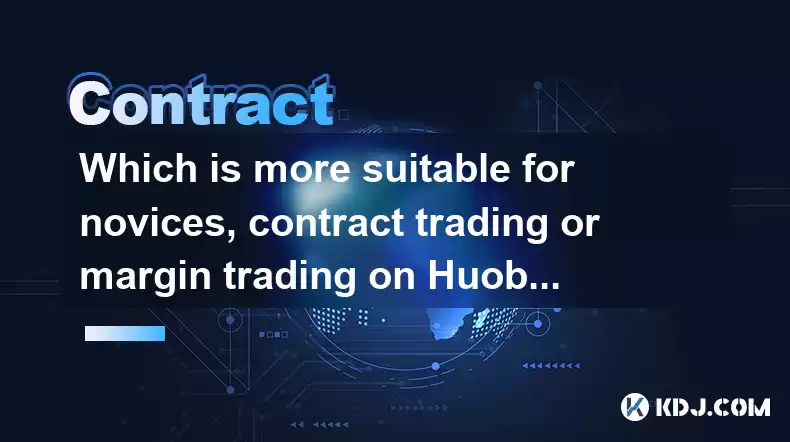
Which is More Suitable for Novices: Contract Trading or Margin Trading on Huobi.com?
As a novice trader venturing into the world of cryptocurrency trading, the choice between contract trading and margin trading on Huobi.com can be a daunting one. Both instruments offer unique advantages and drawbacks, making it crucial to understand their key differences to make an informed decision that aligns with your risk tolerance and trading objectives. This comprehensive guide will delve into the intricacies of each trading type, providing a detailed analysis to help you determine which is more suitable for your trading journey as a beginner.
Step 1: Understanding Contract Trading
Contract trading, also known as futures trading, involves trading contracts that represent the underlying asset, such as Bitcoin or Ethereum. Instead of directly buying or selling the asset, you speculate on its future price movements by entering into a contract with an expiration date. Contract trading offers the potential for higher leverage, allowing you to amplify your profits but also your losses.
Key Features of Contract Trading:
- Leverage: Leverage enables you to trade with a larger position size than your account balance, potentially increasing your returns. However, it also magnifies your potential losses, making it essential to use caution.
- Expiration Dates: Contracts have specified expiration dates, and it's crucial to close or roll over your positions before the contract expires to avoid automatic execution.
- Profit Potential: Contract trading offers significant profit potential due to the use of leverage. However, it's vital to remember that profits can be accompanied by substantial losses.
Step 2: Exploring Margin Trading
Margin trading involves borrowing funds from the exchange to increase your buying power. You can use this borrowed capital to purchase an underlying asset, such as Bitcoin, with the expectation of profiting from price appreciation. Margin trading also offers leverage, but it comes with additional risks and responsibilities.
Key Features of Margin Trading:
- Interest Charges: Margin trading incurs interest charges on the borrowed funds, which can impact your profitability if the trade is not closed promptly.
- Forced Liquidation: If the market moves against your position, the exchange may force you to sell or buy your asset to cover your losses, potentially resulting in significant financial repercussions.
- Leverage: Margin trading provides leverage, enabling you to control a larger position size with a smaller initial investment. However, as with contract trading, leverage amplifies both potential profits and losses.
Step 3: Comparing Contract Trading and Margin Trading for Beginners
Suitability for Novices:
- Both contract trading and margin trading offer leverage, but their risk profiles differ. Contract trading typically carries higher risks due to the potential for rapid price fluctuations and automatic liquidation upon contract expiration.
- Margin trading, while still involving leverage, offers a structured and intuitive interface that can be more beginner-friendly. The risks involved are clearer, and you have more control over your position management.
Complexity and Learning Curve:
- Contract trading involves a deeper understanding of futures contracts, expiration dates, and risk management techniques. It requires more knowledge and experience to navigate successfully.
- Margin trading, on the other hand, has a more straightforward learning curve. Its interface and mechanics are more beginner-friendly, making it easier to grasp the basics.
Capital Requirements:
- Contract trading typically requires a smaller initial capital investment compared to margin trading. This is because you are not purchasing the underlying asset directly.
- Margin trading necessitates a higher initial investment since you are borrowing funds from the exchange to increase your buying power.
Step 4: Choosing the Right Option for You
The suitability of contract trading or margin trading for you depends on your individual circumstances and trading objectives. Consider the following factors when making your decision:
Risk tolerance: If you are a risk-averse trader, margin trading may be a more suitable option due to its more structured environment and clearer risk parameters.
Trading goals: If you aim for short-term, high-profit trades, contract trading can offer the potential for greater rewards, but also comes with higher risks.
Experience level: As a novice trader, margin trading can provide a more controlled and beginner-friendly environment to learn the basics of leveraged trading.
Conclusion
Ultimately, the decision between contract trading and margin trading for novices on Huobi.com is a personal one. Both instruments offer unique advantages and drawbacks, and the best choice depends on your individual risk tolerance, trading objectives, and experience level. By understanding the key differences between these trading types, you can make an informed decision that aligns with your trading goals and minimizes potential risks.
Disclaimer:info@kdj.com
The information provided is not trading advice. kdj.com does not assume any responsibility for any investments made based on the information provided in this article. Cryptocurrencies are highly volatile and it is highly recommended that you invest with caution after thorough research!
If you believe that the content used on this website infringes your copyright, please contact us immediately (info@kdj.com) and we will delete it promptly.
- Dogecoin's Wild Ride: Big Holders, Price Push, and What's Next for the Meme Coin
- 2025-08-12 08:30:12
- Bitcoin to $133,000? Here's What the Experts Are Saying
- 2025-08-12 08:30:12
- Dogecoin, Meme Coins, and Whale Buys: What's the Hype?
- 2025-08-12 06:50:12
- Bitcoin, Ethereum, and the Pump-and-Dump Merry-Go-Round: A New Yorker's Take
- 2025-08-12 07:10:12
- MAGACOIN Mania: Why Holders Are Staking Their Claim in This Bull Season
- 2025-08-12 06:30:13
- Heritage Distilling's Bold Bet: A $360M IP Treasury Powered by Story Protocol
- 2025-08-12 06:30:13
Related knowledge
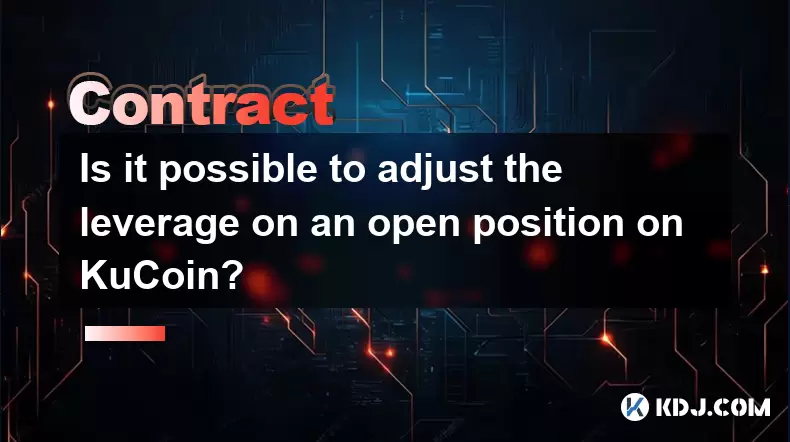
Is it possible to adjust the leverage on an open position on KuCoin?
Aug 09,2025 at 08:21pm
Understanding Leverage in KuCoin Futures TradingLeverage in KuCoin Futures allows traders to amplify their exposure to price movements by borrowing fu...

What cryptocurrencies are supported as collateral on KuCoin Futures?
Aug 11,2025 at 04:21am
Overview of KuCoin Futures and Collateral MechanismKuCoin Futures is a derivatives trading platform that allows users to trade perpetual and delivery ...
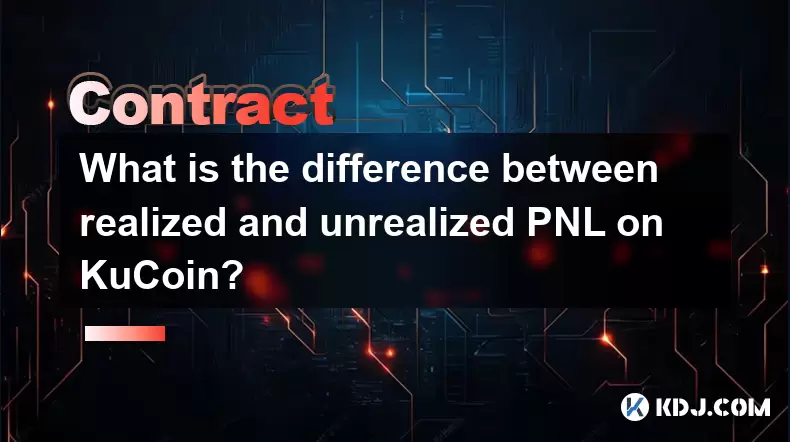
What is the difference between realized and unrealized PNL on KuCoin?
Aug 09,2025 at 01:49am
Understanding Realized and Unrealized PNL on KuCoinWhen trading on KuCoin, especially in futures and perpetual contracts, understanding the distinctio...
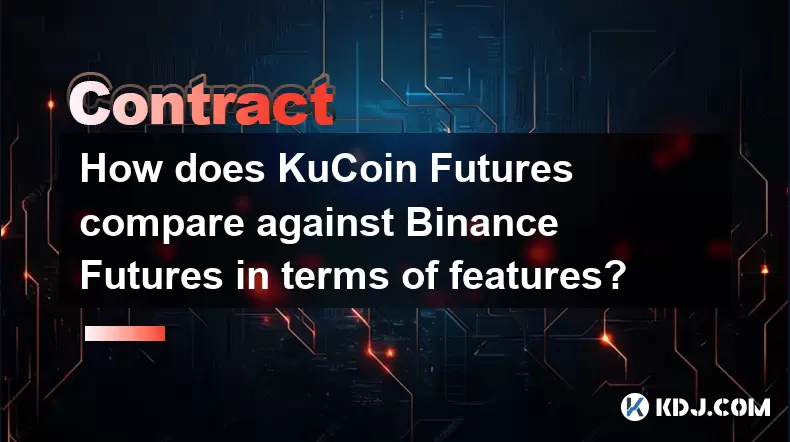
How does KuCoin Futures compare against Binance Futures in terms of features?
Aug 09,2025 at 03:22am
Trading Interface and User ExperienceThe trading interface is a critical component when comparing KuCoin Futures and Binance Futures, as it directly i...
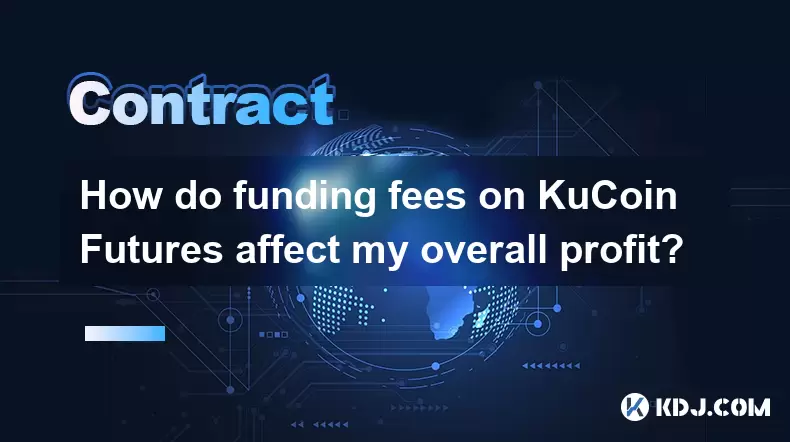
How do funding fees on KuCoin Futures affect my overall profit?
Aug 09,2025 at 08:22am
Understanding Funding Fees on KuCoin FuturesFunding fees on KuCoin Futures are periodic payments exchanged between long and short position holders to ...
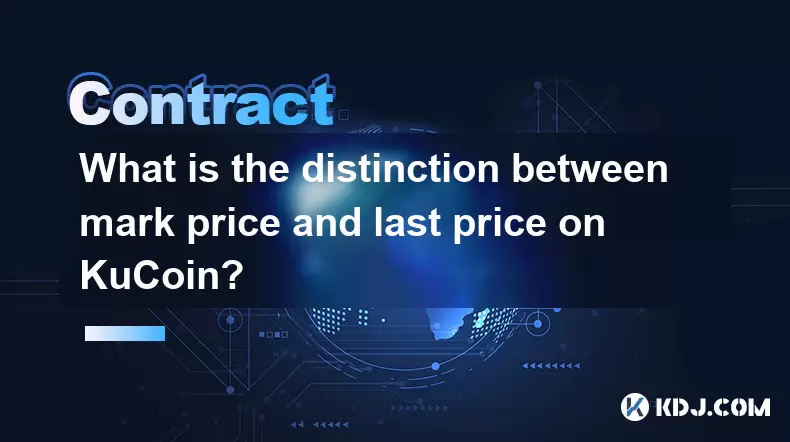
What is the distinction between mark price and last price on KuCoin?
Aug 08,2025 at 01:58pm
Understanding the Basics of Price in Cryptocurrency TradingIn cryptocurrency exchanges like KuCoin, two key price indicators frequently appear on trad...

Is it possible to adjust the leverage on an open position on KuCoin?
Aug 09,2025 at 08:21pm
Understanding Leverage in KuCoin Futures TradingLeverage in KuCoin Futures allows traders to amplify their exposure to price movements by borrowing fu...

What cryptocurrencies are supported as collateral on KuCoin Futures?
Aug 11,2025 at 04:21am
Overview of KuCoin Futures and Collateral MechanismKuCoin Futures is a derivatives trading platform that allows users to trade perpetual and delivery ...

What is the difference between realized and unrealized PNL on KuCoin?
Aug 09,2025 at 01:49am
Understanding Realized and Unrealized PNL on KuCoinWhen trading on KuCoin, especially in futures and perpetual contracts, understanding the distinctio...

How does KuCoin Futures compare against Binance Futures in terms of features?
Aug 09,2025 at 03:22am
Trading Interface and User ExperienceThe trading interface is a critical component when comparing KuCoin Futures and Binance Futures, as it directly i...

How do funding fees on KuCoin Futures affect my overall profit?
Aug 09,2025 at 08:22am
Understanding Funding Fees on KuCoin FuturesFunding fees on KuCoin Futures are periodic payments exchanged between long and short position holders to ...

What is the distinction between mark price and last price on KuCoin?
Aug 08,2025 at 01:58pm
Understanding the Basics of Price in Cryptocurrency TradingIn cryptocurrency exchanges like KuCoin, two key price indicators frequently appear on trad...
See all articles

























































































